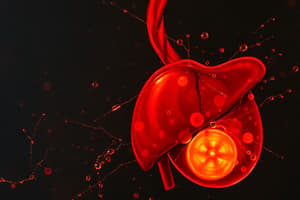Podcast
Questions and Answers
What is the form of bilirubin that is water insoluble and cannot pass through the glomerular barrier of the kidney?
What is the form of bilirubin that is water insoluble and cannot pass through the glomerular barrier of the kidney?
- Unconjugated bilirubin (correct)
- Conjugated bilirubin
- Bilirubin glucuronide
- Direct bilirubin
What process converts unconjugated bilirubin into a water-soluble form?
What process converts unconjugated bilirubin into a water-soluble form?
- Oxidation in the blood
- Decomposition with oxygen
- Conjugation with glucuronic acid (correct)
- Absorption in the intestines
What typically enhances the excretion of bilirubin?
What typically enhances the excretion of bilirubin?
- Hyperoxia
- Alkalosis (correct)
- Respiratory distress
- Acidosis
Which condition is NOT typically associated with bilirubinuria?
Which condition is NOT typically associated with bilirubinuria?
What do elevated levels of conjugated bilirubin in the bloodstream generally indicate?
What do elevated levels of conjugated bilirubin in the bloodstream generally indicate?
What is the normal adult urine bilirubin concentration that typically goes undetected by usual testing methods?
What is the normal adult urine bilirubin concentration that typically goes undetected by usual testing methods?
Which congenital hyperbilirubinemia does NOT result in bilirubin appearing in the urine?
Which congenital hyperbilirubinemia does NOT result in bilirubin appearing in the urine?
What medical condition is characterized by the presence of bilirubin in the urine?
What medical condition is characterized by the presence of bilirubin in the urine?
Flashcards
Bilirubin
Bilirubin
A yellow pigment formed from the breakdown of hemoglobin. It's initially unconjugated (indirect) and water insoluble, so it can't be excreted in urine. It gets conjugated (direct) in the liver, making it water soluble and allow it to be excreted through urine and bile.
Unconjugated Bilirubin (Indirect Bilirubin)
Unconjugated Bilirubin (Indirect Bilirubin)
Unconjugated bilirubin is not bound to glucuronic acid. It's water insoluble and unable to be filtered by the kidneys.
Conjugated Bilirubin (Direct Bilirubin)
Conjugated Bilirubin (Direct Bilirubin)
Conjugated bilirubin is bound to glucuronic acid, making it water soluble and able to pass through the kidneys and be excreted in urine.
Bilirubinuria
Bilirubinuria
Signup and view all the flashcards
Biliary Obstruction
Biliary Obstruction
Signup and view all the flashcards
Hepatocellular Disease
Hepatocellular Disease
Signup and view all the flashcards
Hyperbilirubinemia
Hyperbilirubinemia
Signup and view all the flashcards
Dubin-Johnson and Rotor Syndromes
Dubin-Johnson and Rotor Syndromes
Signup and view all the flashcards
Study Notes
Bilirubin Metabolism and Urine
- Bilirubin is a byproduct of hemoglobin breakdown, created in reticuloendothelial cells (spleen, liver, bone marrow)
- Initially, bilirubin is bound to albumin (unconjugated/indirect bilirubin)
- Unconjugated bilirubin is insoluble in water, preventing kidney filtration
- Unconjugated bilirubin is transported to the liver
- In the liver, bilirubin is conjugated with glucuronic acid, forming bilirubin glucuronide (conjugated/direct bilirubin)
- Conjugated bilirubin is water-soluble and filterable through the kidney glomerulus
- Normal adult urine contains only a trace amount of bilirubin (0.02 mg/dL) undetectable by standard tests.
- Excretion is aided by alkalosis.
- Elevated conjugated bilirubin in the blood indicates biliary issues or liver dysfunction.
Bilirubinuria - Causes
- Biliary Obstruction: Intrahepatic (within the liver) or extrahepatic (outside the liver)
- Examples: bile duct obstructions (e.g., gallstones, pancreatic cancer)
- Intracanalicular pressure increases from inflammation, scarring, or liver cell swelling leading to blockage.
- Hepatocellular Disease: Liver cells cannot adequately excrete conjugated bilirubin into the bile ducts
- Examples: acute viral hepatitis, drug-induced cholestasis (bile secretion impairment), acute alcoholic hepatitis.
- Early Liver Damage & Cholestasis: Bilirubinuria may precede jaundice (yellowing of skin/eyes) and be an early sign of liver damage in those exposed to toxins/drugs
- Congenital Hyperbilirubinemias: Some genetic disorders (Dubin-Johnson and Rotor syndromes) cause bilirubin to appear in urine. Others (Gilbert and Crigler-Najjar syndromes) do not.
Studying That Suits You
Use AI to generate personalized quizzes and flashcards to suit your learning preferences.




